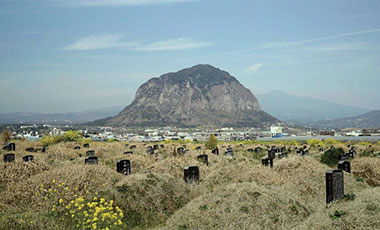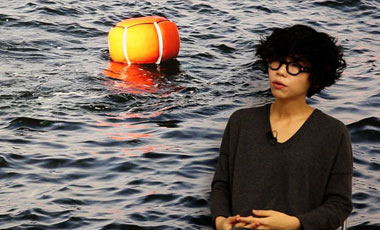People / Interview
Sara Sejin Chang (Sara van der Heide): Healing Colonial Adoption Narratives
posted 10 Nov 2020
Sara Sejin Chang (Sara van der Heide). Photo: POC Stories, 11th Berlin Biennale for Contemporary Art.
Practices of shamanism, the violent eradication of shamanistic cultures by missionaries, healing, ancestry, coloniality, and criminality of contemporary intercountry adoption are the subjects of Sara Sejin Chang’s (Sara van der Heide) new body of work currently on view at the KW Institute for Contemporary Art as part of the 11th Berlin Biennale for Contemporary Art (The Crack Begins Within, 5 September–1 November 2020).
Chang's film installation, titled Four Months, Four Million Light Years (2020) is accompanied by 16 textile and paper banners, and a series of watercolours. Built in a non-linear narrative framework, the 35-minute film—which holds a central position in the room—addresses the stories of those forced to leave their families for the intercountry adoption industry.

Sara Sejin Chang (Sara van der Heide), Four Million Light Years (2020) (still). Courtesy the artist.
It is 'an embodiment of the stories of many', explains the Dutch artist. The colonial engraving of a Shaman or Devil's Priest (1692) by Dutch statesman Nicolaes Witsen acts as a pivotal point in Chang's research, with texts, songs, shamanic poems, watercolours, and the sounds of percussion connecting shamanic practices with colonial history. In so doing, Chang makes palpable a narrative about contemporary Dutch society, while critically re-reading its historical heritage in relation to the nation's participation in the Korean War (1950–1953) and the colonial descriptions of Asian people that it may have produced and circulated in the past.

Sara Sejin Chang (Sara van der Heide), Four Months, Four Million Light Years (2020). Video, colour, sound, textiles, paper, watercolour on paper. 35 min. Exhibition view: The Crack Begins Within, 11th Berlin Biennale for Contemporary Art, KW Institute for Contemporary Art, Berlin (5 September–1 November 2020). Courtesy the artist. Photo: Silke Briel.
Four Months, Four Million Light Years follows on from Chang's ongoing project The Mother Mountain Institute (2017–ongoing), which collects and brings forward the stories of mothers from the Global South whose children are trafficked today for intercountry adoption.
First presented in 2017 as part of the exhibition To Seminar at BAK – basis voor actuele kunst, Utrecht (11 March–21 May 2017), The Mother Mountain Institute focuses on the women who have been erased and silenced in the global adoption industry. The project's first iteration at BAK was composed of an installation, drawings, and sound focusing on the story of a South Korean mother. Situating the life of the birth mother within the constellation of the international and interracial adoption system, Chang created a large wooden enclosure painted to represent the solar system, with two spheres hanging overhead and rotating within the space, representing mother and child as the sun and moon.

Sara Sejin Chang (Sara van der Heide), Patriarchy drawing as part of Mother Mountain Institute (2017–ongoing). Courtesy the artist.
Chang's work traverses an array of formats and mediums, including drawings, installations, performances, film, and interventions. In The German Library Pyongyang (2012) project, first presented in Amsterdam in 2012 at the Goethe-Institut, followed by the 1st Asia Biennial / 5th Guangzhou Triennial in Guangzhou (11 December 2015–10 April 2016), and later the 6th Kuandu Biennial in Taipei, Taiwan (5 October 2018–6 January 2019), Chang recreated the German library originally opened in Pyongyang by the Goethe-Institut between 2004 and 2009, under the claim that it would help North and South Korea with the unification process through Bach and German literature.
Performing an imaginative journey to North Korea built on fiction and history through artistic, linguistic, and graphic interventions, the installation explored the imperialistic notion behind German libraries and learning centres, promoting German culture and values.

Sara Sejin Chang (Sara van der Heide), The German Library Pyongyang (2012). Exhibition view: Seven Questions for Asia, 6th Kuandu Biennale, Taipei (5 October 2018–6 January 2019). Courtesy the artist.
With repetition and insistence, Chang considers different angles of Eurocentric thinking and its penetration in all levels of life and society. Her artworks attempt to deconstruct the institutional bases of power, wherein objects, groups, and individuals are codified, managed, and selectively oppressed according to predetermined notions about their race, gender, and class.
In the film Brussels, 2016 (2017), which covers the period surrounding the terrorist attacks in Brussels and the Brexit referendum, Chang uses the format of a letter to address her mother in Korea, recalling her experience in the city at that time, as a resident at WIELS – Centre for Contemporary Art.
Working with multiple registers and individuals inside and outside the institution, Chang sketched a poetic and political portrait of the Belgian capital.
Rather than mourning histories and personal trajectories, Chang is fascinated by how the past might be reanimated in the future. At the core of her project at the 11th Berlin Biennale for Contemporary Art is a concern with how ideas are transmitted from the past to the present; from the dead to the living.



